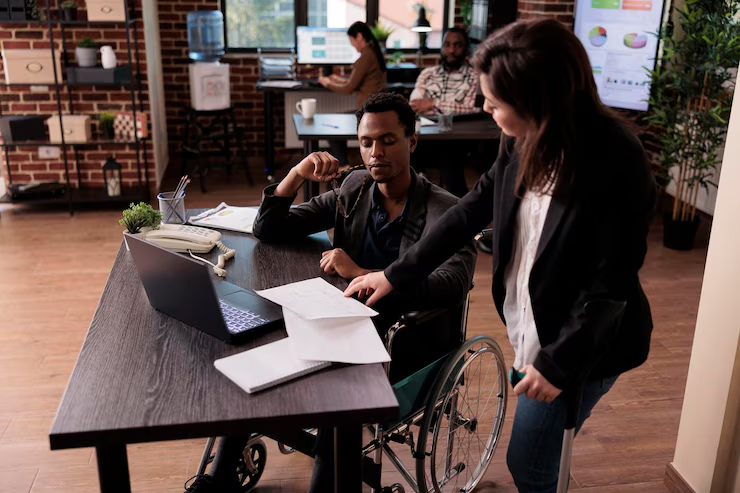
Trust is the cornerstone of healthy relationships and productive workplaces. Despite a heightened focus on increasing awareness about inclusion of persons with disabilities, a persistent trust deficit exists between people with disabilities and able-bodied individuals, fuelled by misconceptions, perceptions, social conditioning, systemic barriers, and historical exclusion. This gap undermines advocacy and inclusion efforts, collaboration, and equity in both social and professional settings. Addressing it requires empathy, intentional action, and a commitment to shared responsibility.
A trust deficit refers to a mutual lack of confidence or reliance between groups, often stemming from unresolved conflicts, stereotypes, or unequal power dynamics. In the context of disability, this deficit arises when able-bodied people underestimate the capabilities of individuals with disabilities or perpetuate exclusionary practices. Conversely, people with disabilities may distrust able-bodied peers due to repeated experiences of marginalization, condescension, or broken promises of inclusion. This cycle of scepticism creates barriers to meaningful connection and collaboration.
In social settings, trust gaps often stem from misconceptions. Able-bodied individuals harbour unconscious biases perpetuated by societal norms, viewing disability through extreme lenses- from pity to inspiration, rather than recognizing the full humanity of disabled peers. Social exclusion—such as inaccessible venues or activities, not including in family or social events—reinforces feelings of invisibility. Meanwhile, people with disabilities may withdraw from social engagement after facing patronizing attitudes or assumptions about their needs.
Organisations are a subunit of the society and the same gap in trust gets mirrored in organisations. In the workplace, trust erodes when physical infrastructure is inaccessible, or able bodied peers exclude persons with disabilities in meetings, day to day interactions, lunch banter etc. Employers might overlook qualified candidates with disabilities due to perceived lack of capability, or fail to provide reasonable accommodations, fostering resentment. Employees with invisible disabilities may fear disclosing their needs due to stigma or retaliation, while able-bodied colleagues might misinterpret their silence as disengagement. Over time, these dynamics breed mistrust and hinder team cohesion.
Inclusion starts with acknowledgement and awareness. Inclusion is also a two-way street. Let us start with exploring the term ‘Temporarily abled people’ or TAP.

The phrase “temporarily abled” reminds us that disability is not a distant reality but a potential part of every human experience. Accidents, illness, or aging can shift anyone’s abilities at any time. Recognising this shared vulnerability dismantles the “us versus them” divide and fosters empathy. Able-bodied individuals often take their physical, sensory, or cognitive privileges for granted, assuming disability won’t affect them. This mindset perpetuates exclusion, as accessibility is treated as an afterthought rather than a universal need.
In social and workplace contexts, this awareness should inspire proactive allyship. For instance, advocating for ramps, captions, or flexible work policies isn’t just about supporting others—it’s about creating systems that could one day support ‘you’. When able-bodied people acknowledge their temporary status, they’re more likely to challenge stereotypes (“disabled people are less capable”) and reject pity or charity driven narratives. Instead, they prioritize dignity, accessibility, and collaboration.
Critically, this perspective combats complacency. Why ignore broken elevators or resist remote or hybrid work options today if you might rely on them tomorrow? Humility also means listening to disabled voices rather than assuming solutions. True inclusion requires designing spaces, policies, and attitudes that serve everyone’s evolving needs.
Ultimately, embracing “temporary ability” isn’t about fear—it’s about solidarity. By building a world that respects disability as part of the human spectrum, we create resilience for all. Able-bodied people have the power to normalize accessibility today, ensuring no one is left behind when their own abilities inevitably change.

Challenge assumptions by learning about disability rights, history, and diverse experiences. Follow advocates with disabilities on social media, read firsthand accounts, and avoid relying on stereotypes.
Prioritise listening over “helping.” Ask individuals about their preferences and needs rather than making assumptions. Use your voice, and privilege, to amplify disabled voices in conversations about accessibility.
Advocate for accessible public spaces (e.g., ramps, captioning) and organize social events that accommodate diverse needs. Invite people with disabilities proactively, ensuring they feel welcomed as equals.
Conduct regular accessibility audits of physical and digital workspaces. Provide accommodations to team members (e.g., screen readers, flexible schedules) as a standard practice, not exceptions.
Implement inclusive hiring practices, such as partnerships with disability job networks. Ensure career advancement opportunities are equally available, and address microaggressions swiftly.
Create safe channels for employees to share feedback. Train managers to engage empathetically with disability-related needs and foster allyship programs to bridge understanding.

While the burden shouldn’t fall solely on disabled individuals, clear communication about preferences (e.g., “I prefer stairs to being lifted”) can reduce misunderstandings. Do not assume that other people understand or kow what you need, even the well-intentioned ones. So do not hesitate to articulate clearly what you need.
Engage with disability networks to share experiences and strategies, from how to write compelling resumes, how to ask for reasonable accommodations during interviews, how to set boundaries and do on. Also build a network of allies who can partner in amplifying voices and normalising accessibility. Collective advocacy can challenge systemic barriers more effectively than individual efforts.
If comfortable, share your experiences to dispel myths. Setting boundaries is key—you’re not obligated to educate others, but dialogue can humanise issues.
While disclosure is a personal choice, transparent communication about necessary accommodations can foster trust with employers. The right reasonable accommodations will enable you to be productive and your authentic self. Seek allies in HR or leadership to advocate alongside you.
Join or form employee resource groups (ERGs) to influence organizational policies, practices and culture. Collective action ensures systemic change, not just individual adjustments. ERGs are not just engagement programs. Ensure that your ERG has tangible goals, even if they are a few goals.
Don't Miss: Urban Women with Disabilities: Insights Into Living, Dating, Working, and Enjoying Life
Demonstrate your skills confidently. Proactively contribute ideas and seek mentorship to challenge biases about capability.
Bridging the trust deficit is not about assigning blame but taking joint accountability. Able-bodied individuals must dismantle systemic barriers and confront biases, while people with disabilities can empower themselves through advocacy and community. In workplaces, leaders should embed inclusion and culture of belonging into policies, from hiring to promotions. Socially, everyone must prioritise accessibility and representation.
Don't Miss: International Day of Persons with Disabilities: Date, History, Significance, And Quotes
Trust is built through consistent action. When able-bodied people move beyond performative allyship to genuine partnership, and when disabled individuals feel heard and valued, relationships transform. The result is a society where differences are celebrated as a strength.
Also watch this video
Herzindagi video
Our aim is to provide accurate, safe and expert verified information through our articles and social media handles. The remedies, advice and tips mentioned here are for general information only. Please consult your expert before trying any kind of health, beauty, life hacks or astrology related tips. For any feedback or complaint, contact us at [email protected].